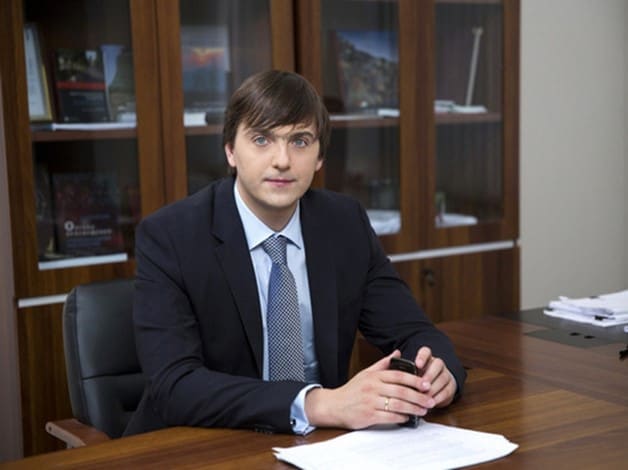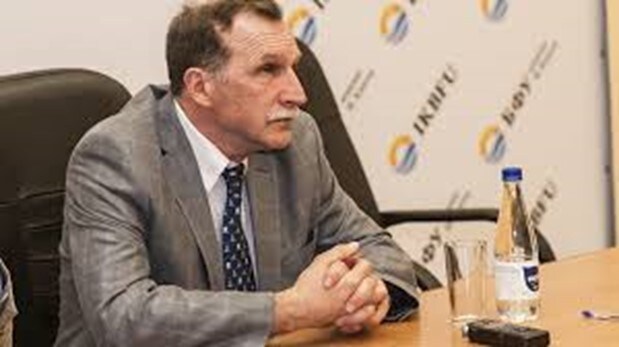The Russian Education Minister, Sergei Kravtsov made a puzzling announcement that henceforth history lesson will start with first grade. Kravtsov included the announcement in a speech that he delivered at the opening of the "Ordinary Nazism" exhibition on display at Moscow's Victory Museum. The announcement raised eyebrows because it appeared to impose an extra burden added to an already intensive program for the new schoolchildren.
Education Ministry's press service issued a clarification: "History education is very much in demand in today's society...It should begin in the first grade. In this case we are not talking about history lessons, but about educational programs." Kravtsov quickly got on the same page as the press service clarification, and claimed that he was speaking not of formal lessons but extracurricular activities.
Kravtsov claimed that his motivation to broaden historical awareness, was a study of 300 Ukrainian school textbooks that distorted history and maligned Russia, something that he Kravtsov would never do to Ukraine's or Belarus' history. Kravtsov also observed that Russian schoolchildren had been "swamped" in March by a stream of fake information that amounted to information terrorism: "The stream of fake news, commercials, calls for destabilizing the situation in the country, which hit our children last month, cannot be called other than information terrorism. And the task of the education system is to help children withstand these challenges."[1]

Sergey Kravtsov (Source: Mk.ru)
Political scientist and columnist George Bovt responded to Kravtsov's announcement. He repeated the arguments that educationally the proposal was a non-starter, but he then addressed what he believed to be the heart of the issue. Such proposals by Kravtsov and others were essentially ideological virtue-signaling by careerist politicians. The recalled some of the worst excesses of czarist Russia and the Soviet Union, when the regime sought to rigidly indoctrinate the students. The result was that such dogmatic teaching yielded a bumper crop of extreme cynics ready to abandon the ideology that they had so passionately professed at the drop of a hat.
Bovt's column follows below:[2]
"Russia's Education Minister, Sergei Kravtsov announced that history lessons will be taught in schools starting from the first grade. 'We’ll do everything to preserve historical memory. I made a decision that history lessons will start in schools in the first grade,' he said, adding that the ministry would not allow Russian history studies 'to treat the nations of Ukraine and Belarus badly.' Now, schoolchildren begin studying the subject in 5th grade.
"Previously, Kravtsov proposed that schools begin the week by hoisting the [Russian] flag accompanied by the Russian anthem. Kravtsov a bit later clarified the essence of his announcement, saying that it wasn’t about history lessons, but about historical education, which will be part of the 'The World Around Us' subject. Anyway, there are no plans to introduce history classes from the first grade in Russia. 'History lessons are being taught (and will continue to do so) starting from the 5th grade. However, starting from elementary school one can discuss the history of one’s family, of the district, of a region, of a small motherland as part of the 'The World Around Us' subject. Trips to museums, exhibitions can be done within the extracurricular activities,' said the head of the Ministry of Education. What will be taught at elementary school?
"Some elements of history education exist in elementary schools within the framework of 'The World Around Us' subject. Starting from a 1st grader till 3rd basic information about the peoples residing in Russia, about the country’s territory, and the neighboring countries is provided. Later, in 4th grade there is an introduction to the World’s and Russian history and to the basics of social studies.
"It’s not until the 5th grade that history lessons become a separate subject and continue to be taught until graduation. History is not an obligatory subject for the USE [i.e. Unified State Exam], as the history USE is a student elective. It’s not the most popular subject to be chosen for the USE exam. It traditionally lags behind [the popularity] of more general subjects, like social studies, biology, physics, and computer science.
"However, there have been talks for a number of years now about making the history exam a mandatory one under the USE. However, the Rosobrnadzor [Federal Service for Supervision in the Sphere of Education and Science] didn’t support the idea.
"The formal reason being that this will increase the number of mandatory subjects for the USE exams, which, consequently, will lead an increased workload for the students that is considered extreme in any case. limit of students. By the way, the same could be said about introducing a separate history class for first graders. At the expense of what [subjects] would one introduce such [history lessons]?
"Simultaneously, another threat arises, that also applies to the introduction of a mandatory history exam in the USE. History as a subject and as a science is a complicated matter, provided it’s taught well, not 'dogmatically' (a term, popular term during the Soviet times. Google it!). History is contradictory, full of heroes, whose legacy is difficult to fit into a black-and-white picture of the world with a definite plus or minus sign. At the same time, any reinforcement of the ideological dimension [in schools] ineluctably won’t lead only to the primitivization of the subject, but will also dilute it, make it uninteresting, and will ultimately alienate students from an in-depth study of their native country's history. Not to mention the global context, which some are eager to rewrite from 'Adam to Potsdam' in order to suit the current political situation.
"This was already the case in Soviet schools, when such primitive indoctrination caused generations of cynics to appear, who instantly exchanged one ideological envelope for another, without even breaking a sweat. This was the case in czarist Russia too, where everyone supposedly learned God's law in parochial schools, and then, when the [October] revolution broke out, such people began destroying churches, knocking down church bells, and setting up stables and warehouses there (as well as massacring the priests).
"Naturally, there is nothing wrong with starting history education in elementary school. This is a correct thing. But we shouldn’t do it in the style of the Law of God instruction, or, of its Soviet version, Scientific Communism, where any deviation from doctrine is equated with dangerous heresy. Are elementary school teachers, whose primary task is to report on the sound work on patriotic education, capable of doing this? Will they be able to diverge from stilted images and explain to children all the complexities and contradictions of our multifaceted and dramatic history on a level comprehensible to them? And will children aged 7 or 10 be able to absorb this information with interest?
"Of course, considering the current political moment, many officials and politicians want to be registered in support of proposals to strengthen 'patriotic education,' and even more in the task of 'eradicating subversion.' For instance, there have already been proposals to establish some sort of public art councils to review, or to put it simply, to censor works and events in the art world. What will be the makeup of such a council? Of grannies [sitting] on front porch benches? Of security services veterans? Of those who can shout loudest 'For the Motherland!' while implying their own rivulet of funding from the mighty budget streams?
"We've all been through this before in our recent history. As a result, we turned what was supposed to be ideals of social justice into ideological rigidity and dogmatism. These ideals have been white washed to the point of harsh cynicism in the name of a Komsomol or party [CPSU] career free from fear, reproach, and principles.
"However, the only history’s lesson, as the saying goes, is that history teaches one nothing. However, since this lady named Clio [the muse of history in Greek mythology] is complex and full of contradictions, then we must draw a non-linear conclusion: we must teach history even better. (including at schools of course)."

George Bovt (Rubaltic.ru)








